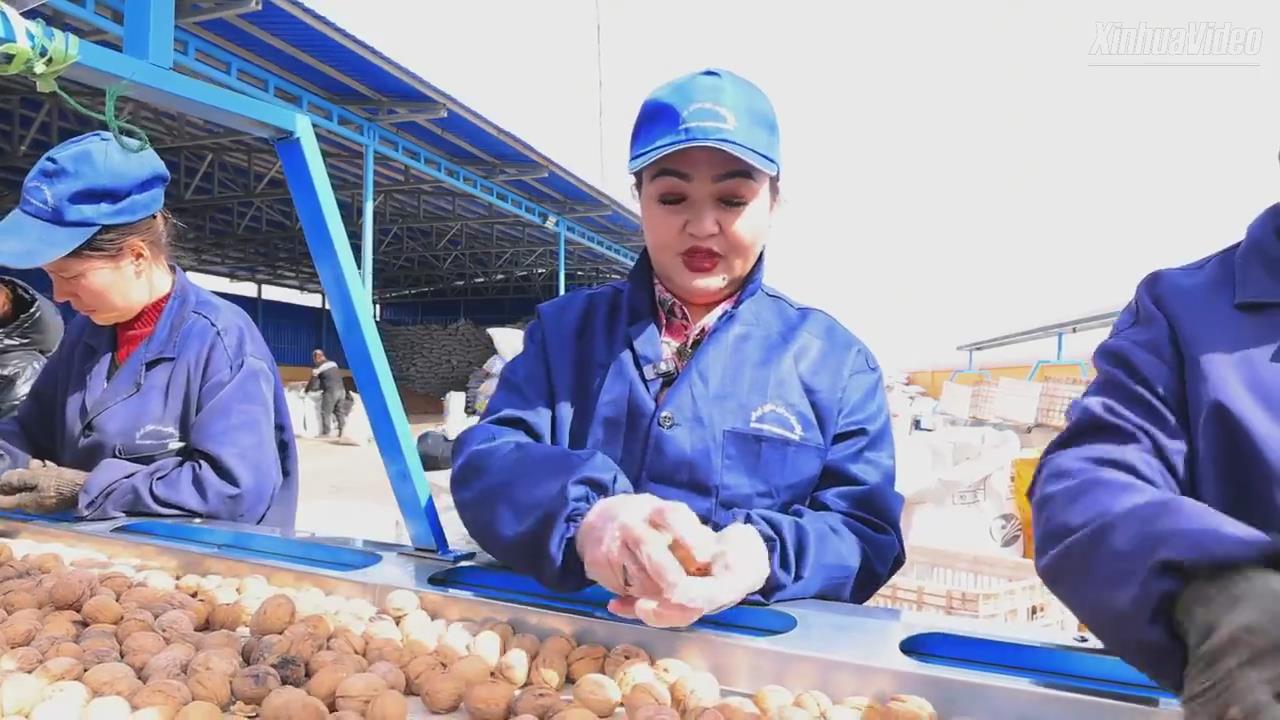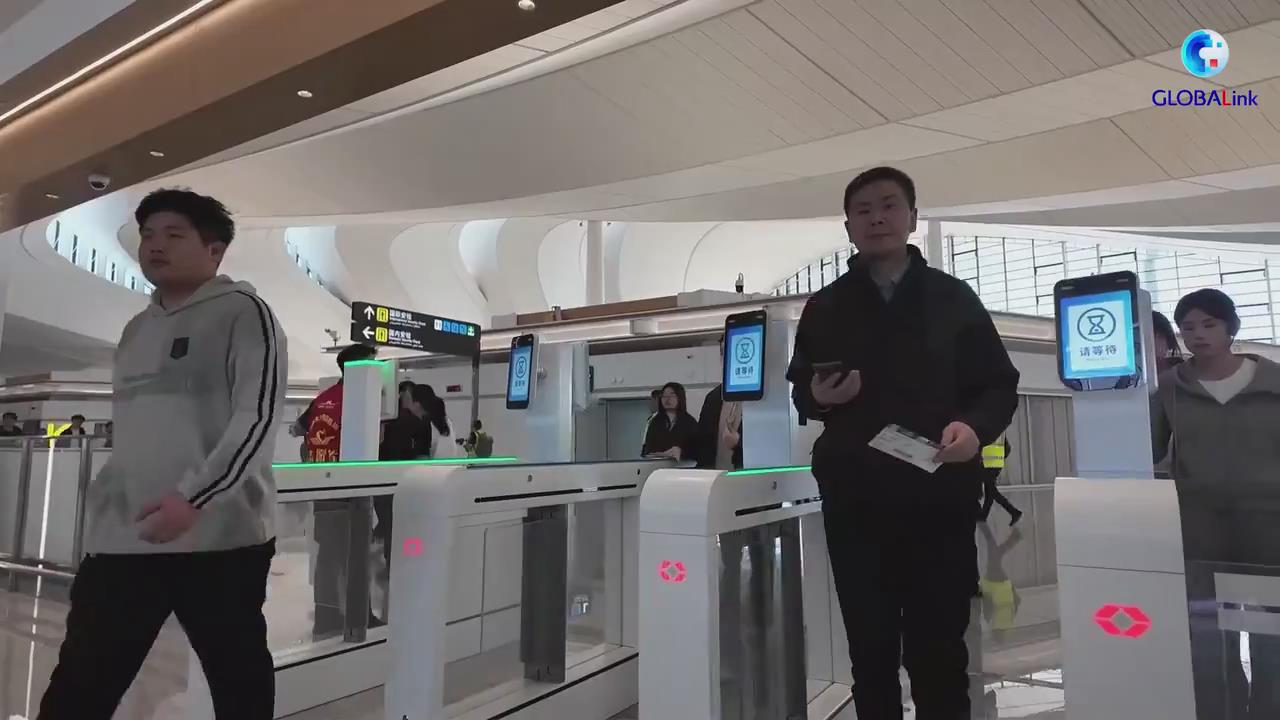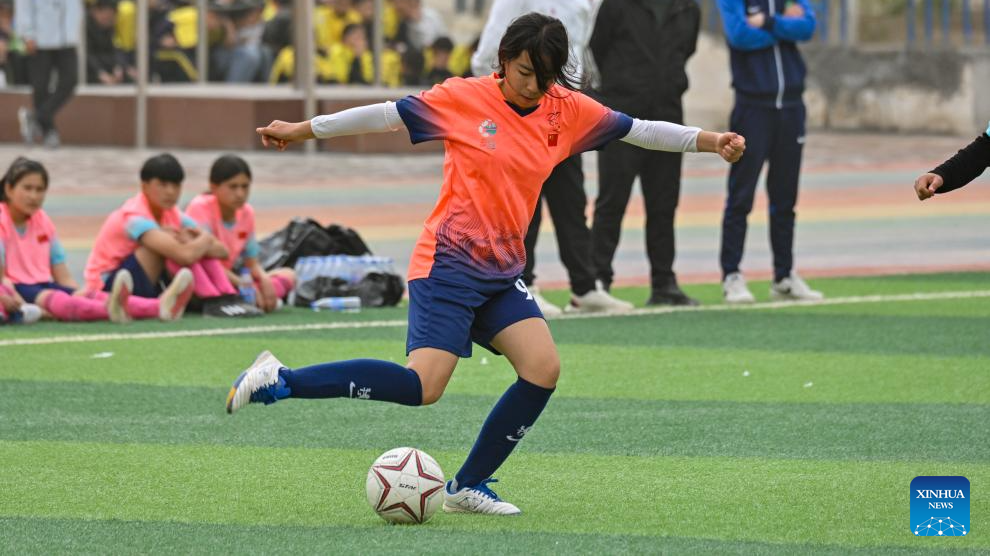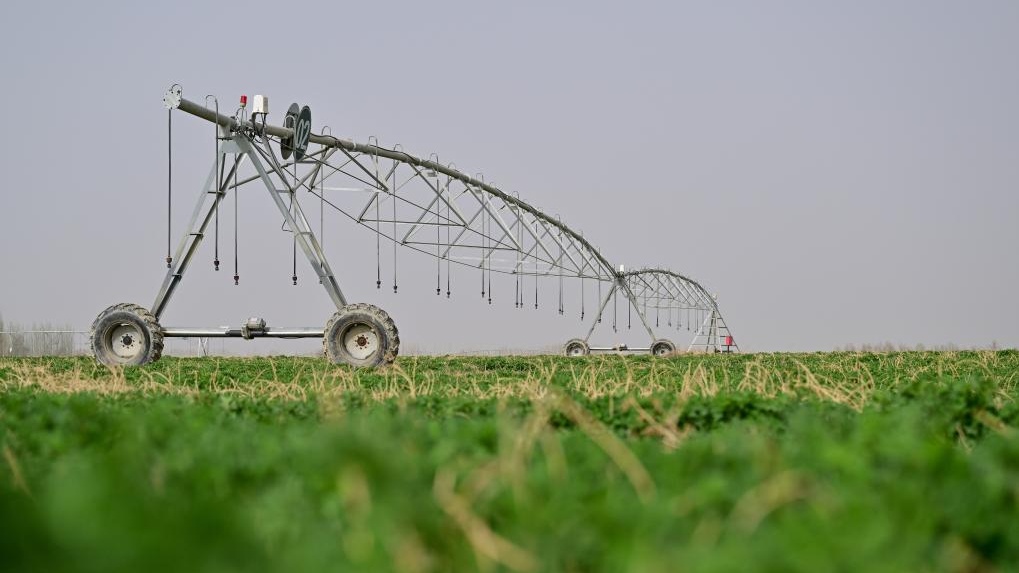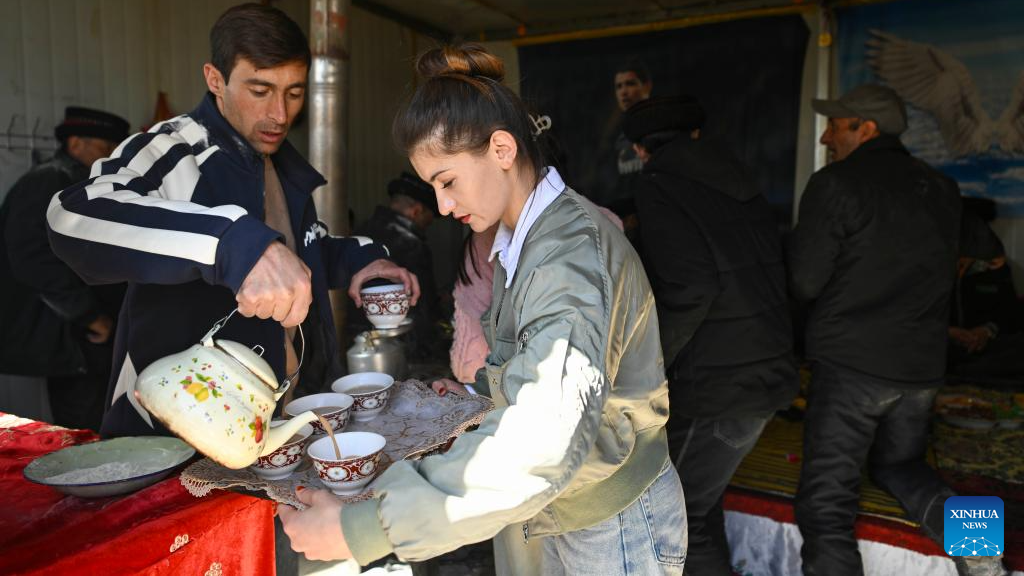.jpg)
Photo taken on April 30, 2021 shows the 8th Press Conference on Xinjiang-related Issues in Beijing. Photo by Li Rui
Bi Haibo: Friends from the press, good morning, welcome to the eighth Press Conference on Xinjiang-related issues held at the International Press Center of the Ministry of Foreign Affairs. Up till now, some anti-China forces in the world have concocted false reports about the existence of "large-scale forced labor" in Xinjiang. Some countries have resorted to a partial belief and imposed unreasonable sanctions on enterprises in Xinjiang under the pretext of so-called "forced labor".
Today, we are here to hold a special press conference on Xinjiang-related issues to give you more facts about the labor and employment in Xinjiang. Now I would like to invite Xu Guixiang, Spokesman of the People's Government of the Xinjiang Uygur Autonomous Region, to brief you on relevant information.
.jpg)
Spokesman of People’s Government of Xinjiang Uygur Autonomous Region Xu Guixiang answers questions at the 8th Press conference on Xinjiang-related Issues in Beijing, April 30,2021. Photo by Li Rui
Xu Guixiang: Good morning, everyone! Today, we are holding a special press conference on Xinjiang- related issues. Many of the journalists present are old friends. You have attended the previous press conferences and sent out a lot of reports. Here, I would like to express my sincere thanks. Let me introduce the people from Xinjiang who are present at today's press conference first. They are: Duan Wanjun, Deputy Director of Research Office of the People's Government of Xinjiang Uygur Autonomous Region. Yao Yuzhen, Chairman of Xinjiang Uygur Autonomous Region Committee of the China Council for the Promotion of International Trade. Wubuliaisan Wubulikasimu, Vice President of Xinjiang Uygur Autonomous Region Garment Industry Association. Peng Changming, vice president of the Xinjiang Uygur Autonomous Region Cotton Association. He Ning, Secretary of the Board of Directors of DaQo New Energy Co., Ltd. Patiguli Tuersun, the rotating director of Xinjiang Aksu Huafu Color Spin Co., Ltd. Ailida Tuerahemaiti, employee’ representative of Yili Garment Company. Next, they will introduce the employment situation of Xinjiang.
The reason for the arrangement of Xinjiang's labor employment aspects of the content, because in recent years, the anti-China forces in the US and the West have used the so-called "forced labor" in Xinjiang as an excuse to impose temporary detention orders and put relevant institutions and enterprises in Xinjiang on the "List of Export Controlled Entities". Xinjiang's textile and clothing, tomato and high-tech industries have been suppressed, and some enterprises have been affected to varying degrees. In early 2021, the US Solar Energy Industry Association announced the formation of the so-called "Anti-Forced Labor" Alliance, aiming at the photovoltaic industry in Xinjiang, China, and tried to use the tactics of cracking down on the cotton industry in Xinjiang to label the photovoltaic industry in Xinjiang as "forced labor" and curb the development of the photovoltaic industry in Xinjiang. Today, we have also specially invited Mr. He Ning, Secretary of the Board of Directors of DaQo New Energy Company, to introduce the development of the photovoltaic industry in Xinjiang. On April 21, the Foreign Affairs Committee of the US House of Representatives deliberated and passed the so-called Uygur Forced Labor Prevention Act, which falsely accused China of "forced labor" in Xinjiang and called for accountability and sanctions against relevant entities and individuals in China.
The so-called existence of "forced labor" in Xinjiang is a false proposition. First, the employment of people of all ethnic groups in Xinjiang is protected by law. Xinjiang always abides by the spirit of the Constitution of the International Labour Organization and relevant conventions, and strictly implements the Labor Law of the People's Republic of China and other laws and regulations. The establishment, operation, supervision and mediation of all kinds of labor relations are carried out on the track of rule of law. Second, people of all ethnic groups in Xinjiang enjoy complete freedom of employment. All ethnic groups, including the Uygur people, have the freedom to choose their jobs, go where they want and do what they want, and their personal freedom has never been restricted. What the government has done is to improve various policies to promote employment, build an employment information platform actively, and provide a good labor and employment environment. Third, the labor rights and interests of people of all ethnic groups in Xinjiang are protected in accordance with the law. The rights of workers of all ethnic groups to remuneration, rest and vacation, occupational safety and health, social insurance and welfare are all protected in accordance with the law. The rights and interests of workers of all ethnic groups in Xinjiang and other areas, including religious belief, ethnic culture and spoken and written language, are respected and protected in accordance with the law.
The anti-China forces in the US and the West fabricated the fallacy of "forced labor" in Xinjiang, cracking down on related industries and enterprises in Xinjiang wantonly. It has seriously violated international law and basic norms governing international relations, the principles of the market economy and the rules of free trade, seriously undermined the chains of global industrial, supply and value, and harmed the interests of all parties. It is a naked act of power politics and bullying. Their fundamental aim is to conduct "industrial genocide" against Xinjiang, undermine China's cooperation in global value chains, weaken the international competitiveness of Chinese enterprises, exclude China from the world market, and realize the plot of "controlling China by Xinjiang" on a larger scale. Xinjiang will take strong measures to fight back resolutely and vowed to fight all kinds of anti-China forces to the end.
Next, I would like to invite the person concerned to brief us on the relevant situation in light of their respective realities.
Xu Guixiang: First of all, I would like to invite Yao Yuzhen, Chairman of the Xinjiang Uygur Autonomous Region Committee of the China Council for the Promotion of International Trade, to brief us on the relevant situation.
.jpg)
Yao Yuzhen answers questions at the 8th Press conference on Xinjiang-related Issues in Beijing, April 30,2021.Photo by Li Rui
Yao Yuzhen: In recent years, anti-China forces in the US and the West have deliberately fabricated the charges of "forced labor" to suppress and impose sanctions on the cotton and textile and garment supply chains in Xinjiang continuously. Recently, a number of clothing brands issued a statement to ban Xinjiang cotton, seriously damaged the reputation of Xinjiang cotton textile industry, causing a bad impact. It is an important mission of Xinjiang Council for the Promotion of International Trade to protect and safeguard the reputation of foreign trade enterprises and the legitimate rights and interests of workers of all ethnic groups in Xinjiang. Anti-China rumors and slanders by the US and Western forces have seriously damaged the interests of textile and garment enterprises in Xinjiang, seriously impaired the reputation and personal dignity of workers of all ethnic groups. We hereby express our strong indignation and firm opposition!
In fact, the cotton planting, textile and garment industries in Xinjiang always regard the protection of labor rights as one of the basic contents of safeguarding human dignity and human rights, protecting the labor rights of people of all ethnic groups in accordance with the law, observing international labor and human rights standards actively, respecting the wishes of workers fully, and striving to improve the working environment and conditions. There is no such thing as "forced labor."
In Xinjiang, what farmers grow is their own choice. Cotton is more profitable than grain, and farmers have more incentive to grow cotton. From sowing, to harvesting, to selling, all steps are free and autonomous, without any reason or need for interference or coercion. Cotton production in Xinjiang has long been highly mechanized, and does not require a large number of "cotton-picking workers" even during the busy picking season. According to 2020 data released by Xinjiang's agricultural department, the mechanically picked rate of cotton in Xinjiang has reached 69.83 percent. With the popularization of machine-picked cotton, the amount of labor used to pick cotton is greatly reduced, and there is no "forced labor".
Xinjiang textile and garment enterprises always taking the will of workers as the basic basis, ensuring that workers of all ethnic groups enjoy equal employment opportunities and employment rights in accordance with the law, remaining committed to creating a fair, free and secure employment environment to attract and retain employees of all ethnic groups, especially those of ethnic groups, stimulating their enthusiasm, initiative and creativity in work, improving their labor skills and cultural quality, and realizing the close combination of long-term development of enterprises and personal development of employees. Textile and garment enterprises employ employees through independent recruitment, and employees of different groups, genders and religions are treated equally. Enterprises sign labor contracts with employees, providing them with necessary remuneration, providing good working and living conditions, and providing halal food for employees of relevant ethnic groups, so as to ensure that their work is comfortable, their lives at ease and their families rest assured. Trade unions have been established in all enterprises to protect the legitimate rights and interests of all employees, including those of ethnic groups. Some textile and garment enterprises implement labor and social standards such as BSCI (Business Social Compliance Initiative)) and SLCP (Social and Labor Convergence Project), and some of them have accepted and passed the human rights assessment made by foreign third-party evaluation institutions. For example, in 2019, the accuracy index of Aksu Huafu Color Spin Co., Ltd. in the "Social Labor Convergence Project" (SLCP) audit reached 96.9%, fully proving that there is no so-called "forced labor" in the enterprise.
The legitimate rights and interests of employees of all ethnic groups and other ethnic groups who work in Xinjiang textile and garment enterprises are effectively protected. Ethnic groups in Xinjiang have the right to choose their own jobs. After working in textile and garment enterprises, they voluntarily sign labor contracts with these enterprises and establish labor relations protected by law. Their personal freedom has never been restricted. Ethnic groups employees enjoy equal pay for equal work, and enjoy the same benefits of old-age insurance, medical insurance, unemployment insurance, work-related injury insurance and maternity insurance. Ethnic groups employees' customs and habits, freedom of religious belief and the right to use their own spoken and written languages are fully respected and guaranteed. After many ethnic groups workers get a stable employment in textile and garment enterprises, they also introduce their relatives, friends and persons from the same village to the enterprises to find jobs.
Facts have proved that the so-called "forced labor" of ethnic groups in Xinjiang is a completely unfounded and unjustifiable lie. Here, we strongly urge some Western institutions and personnel to face up to the facts, put aside their prejudices, immediately stop hyping up the so-called "forced labor" issue, immediately stop imposing any restrictions on China's Xinjiang textile and garment supply chain and related products, and don’t go further and further down the wrong path.
Xu Guixiang: Next, please watch a video.
Xu Guixiang: Then, I'd like to invite Wubuliaisan Wubulikasimu, vice president of the Garment (Clothing) Industry Association of Xinjiang Uygur Autonomous Region, to brief us on the relevant situation.
.jpg)
Obuliasan Obulqsm answers questions at the 8th Press conference on Xinjiang-related Issues in Beijing, April 30,2021.Photo by Li Rui
Obuliasan Obulqasm: I’m Obuliasan Obulqasm, the vice president of the Garment (Clothing) Industry Association of Xinjiang Uygur Autonomous Region to brief us on the relevant situation. Recently, The anti-China forces in the US and the West deliberately fabricated and distorted facts on the pretext of "forced labor" to suppress and sanction garment enterprises in Xinjiang. On behalf of the Xinjiang Garment (Clothing) Industry Association, Xinjiang Garment Enterprises and all their employees, I express my strong indignation and firm opposition!
Xinjiang Garment (Clothing) Industry Association is an organization that serves the garment enterprises in Xinjiang. It is always committed to safeguarding the legal rights of employees. We made full use of a series of preferential policies and measures issued by the government to support the development of the garment industry, create more jobs, and help surplus rural workers find jobs locally or nearby and get jobs in cities in an orderly manner. We strictly require enterprises to recruit working-age workers in accordance with the Labor Law of the People's Republic of China and other laws and regulations. Employees can choose their employers on their own according to the position information, working environment, salary, benefits and other conditions, so as to realize a completely independent "two-way choice".
According to the Labor Contract Law of the People's Republic of China and other relevant laws and regulations, Xinjiang Garment Enterprises sign labor contracts with employees on the premise of equality and voluntary. Carrying out productive labor in accordance with the working hour system determined by the Provisions of the State Council on Working Hours of Workers and Staff and other relevant regulations. In the salary distribution, the implementation of the "distribution according to work, more work more gain" fair distribution principle, the enterprise according to the completion of the production task of employees, pay the corresponding salary and treatment, and pay the "five insurance" on time and in full amount. At the same time, the enterprise provides internal skills training channels, constantly improving the development space of employees, and gradually increasing the income level of employees, helping poor families to achieve "employment for one person, poverty alleviation for the whole family". For example, the average annual income of working-age workers in Kashgar is about 4,000 yuan when they farming at home, while the average annual income of working-age workers in enterprises is more than 30,000 yuan. Through hard work, employees have improved their family life, and their sense of gain and happiness have been significantly enhanced.
Xinjiang garment enterprises fully respect the freedom of job choice and personal freedom of ethnic groups employees, respect and guarantee their freedom of religious belief, their right to use their own spoken and written languages, and respect and protect their customs and habits. The company provides free halal foods and dormitories for ethnic groups employees, purchasing sports and entertainment supplies, organizing and carrying out a variety show, sodality and festival dinner, discussion and other activities, enriching their amateur cultural life constantly.
Over the years, the garment industry in Xinjiang has enjoyed a good momentum of development. Enterprises have provided a large number of jobs, helped people of all ethnic groups to work and find employment actively, protected the legitimate rights and interests of employees of all ethnic groups fully, and improved the living standards of employees of all ethnic groups significantly, which is a fact for all to see. There is no such thing as "forced labor" in Xinjiang garment enterprises, and no rumors or slanders can erase the fact that employees of all ethnic groups in Xinjiang garment enterprises create a happy life through their own industrious hands.
Xu Guixiang: Next, please watch a video.
Xu Guixiang: Then, I'd like to invite Peng Changming, the vice president of the Cotton Association of Xinjiang Uygur Autonomous Region, to brief us on the relevant situation.
.jpg)
Peng Changming answers questions at the 8th Press conference on Xinjiang-related Issues in Beijing, April 30,2021.Photo by Li Rui
Peng Changming:Recently, some Western countries and industry associations have imposed sanctions on the cotton industry in Xinjiang on the grounds of so-called "forced labor". Xinjiang Cotton Association expressed strong dissatisfaction and great indignation to this kind of ugly behavior. We hereby solemnly declare that: we firmly oppose any act of stigmatizing Xinjiang cotton, and resolutely oppose the actions of some international brands and institutions that exclude Xinjiang cotton and its products based on lies and false information. The allegation of "forced labor" in Xinjiang is completely untrue and a complete lie and political manipulation.
Xinjiang is endowed with unique natural conditions, abundant sunshine and long growth cycle of cotton. It is not only the largest high-quality cotton production base in China, but also one of the most important high-quality cotton production bases in the world, occupying a pivotal position in China and even the world. Xinjiang's annual cotton output is about 5.7 million tons. Cotton production in Xinjiang covers a wide area, with more than 50% of farmers planting cotton. Growing cotton has become the main source of income for local farmers in Xinjiang, especially those in the relevant areas of southern Xinjiang, and cotton planting income accounts for more than 80% of the total agricultural income. The production and development of cotton in Xinjiang ensured the livelihood of cotton growers, cotton textile workers and their family members and improved their life. Especially in recent years, the promotion and popularization of machine-picked cotton have improved the efficiency of cotton planting in Xinjiang, and greatly reduced the planting cost, especially the expenditure of labor cost.
The improvement of cotton production capacity in Xinjiang has driven the development of cotton textile industry in Xinjiang. At present, the cotton textile industry in Xinjiang, solving the local employment of nearly one million people, and becoming one of the important ways to promote the employment of the poor labor force and help the fight against poverty. As an important part of the local textile and garment industry, the cotton textile industry in Xinjiang has made great contributions to the elimination of poverty in the region.
For a long time, the Xinjiang Cotton Association is committed to promoting the high quality and sustainable development of Xinjiang cotton industry. The production standard of cotton and its manufactured products is "environmentally friendly, decent labor, good quality, full traceability". Constantly improve the cotton and cotton products production and management of the organization, professional degree, to create a high quality image of cotton products in Xinjiang comprehensively. We will continue to firmly safeguard the legitimate rights and interests and fundamental interests of the whole cotton industry chain in Xinjiang, continue to serve the members of the Association and the industry, play a "bridge" and "link" role between the government, enterprises and cotton, and promote the healthy development of the cotton industry in Xinjiang.
Xinjiang Cotton Association welcomes overseas brands and multinational enterprises in the textile supply chain system to visit Xinjiang, to take a look at the vigorous development of our cotton industry in Xinjiang, the delightful sight of ten thousand mu cotton field, to learn about the development of cotton planting and cotton spinning industry in Xinjiang on-the-spot, to learn about the employment and poverty alleviation efforts of people of all ethnic groups in Xinjiang, to make business decisions based on objective facts. We are looking forward to establishing an objective and friendly textile industry cooperation relationship with the majority of cotton textile enterprises and institutions.
Xu Guixiang: Next, please watch a video.
Xu Guixiang: Then, I'd like to invite He Ning, Secretary of the Board of Directors of DaQo New Energy Co., Ltd, to brief us on the relevant situation.
.jpg)
He Ning answers questions at the 8th Press conference on Xinjiang-related Issues in Beijing, April 30,2021.Photo by Li Rui
He Ning: In early 2021, the US Solar Energy Industry Association announced the formation of the so-called "Anti-Forced Labor" Alliance, aiming at the photovoltaic industry in Xinjiang, China, and tried to use the tactics of cracking down on the cotton industry in Xinjiang to label the photovoltaic industry in Xinjiang as "forced labor" and curb the development of the photovoltaic industry in Xinjiang, to undermine China's participation in the global PV industry value chain. We are deeply angry and strongly condemn this.
Xinjiang DaQo New Energy Co., Ltd. is a high-purity polysilicon production enterprise invested and constructed by DaQo New Energy Company in Shihezi City of Xinjiang Uygur Autonomous Region. In 2020,9 billion yuan. At present, 100% of our products are sold in China. Our employees come from Chongqing, Gansu, Hebei and Xinjiang, mainly through online recruitment, campus recruitment, talent market, employee introduction and other channels. Almost all of our employees are engineers and technical workers with professional chemical related knowledge and skills. All of them, including ethnic groups employees, sign labor contracts with the company in accordance with the law on the principle of voluntary and equality, and receive corresponding remuneration. Everyone works voluntarily, chooses his or her own job, and comes and goes as he or she wishes.
It needs to be emphasized that our company is a legally registered private enterprise that produces and operates in accordance with laws and regulations. We have always followed the spirit of the Constitution of the International Labour Organization (the International Labor Organization Charter) and relevant conventions, and strictly abide by the Labor Law of the People's Republic of China and the Regulations of Xinjiang Uygur Autonomous Region on the Protection of Workers' Labor Rights and Interests, and other laws and regulations. We faithfully fulfill social responsibilities, abide by the code of business ethics. In accordance with the law, ethnic groups employees are guaranteed equal employment and non-discrimination, and their freedom of movement is guaranteed, as well as their rights to remuneration, rest and vacation, occupational safety and health protection, and social insurance and welfare. The average salary of employees in our company is 6000 yuan/month. Everyone is very satisfied with it and cherish the opportunity to work now. There is no such issue as "forced labor", "surveillance" or "suppression" of ethnic groups employees' customs and religious beliefs.
To promote the development of renewable energy, represented by photovoltaic, and to promote energy transformation has become the development consensus of all countries in the world. China's photovoltaic industry is not only serving a country's market, but the global market. At the same time, we will not be afraid of any unfair treatment. If you want to "industrial extinction" of photovoltaic industry in Xinjiang, you should ask whether the PV industry in China and the PV market in the world agree to it?!
Finally, on behalf of the company, I would like to extend a sincere invitation to all the solar photovoltaic industry practitioners around the world, including the solar industry practitioners in the United States, friends of the American Solar Energy Industry Association, and investors in the solar industry around the world. We sincerely invite all of you to visit Shihezi city in Xinjiang, to see the real life of the people in Xinjiang, and also to visit Xinjiang DaQo New Energy Co., Ltd, which is a highly automated, digital and intelligent polysilicon factory in the world. Thank you very much.
Xu Guixiang: Next, I'd like to invite Ailida Tureahmaiti, the employee representative of Yili Garment Company, to brief us on the relevant information.
.jpg)
Alida Tureahmaiti answers questions at the 8th Press conference on Xinjiang-related Issues in Beijing, April 30,2021.Photo by Li Rui
Alida Tureahmaiti: My name is Ailida Tureahmaiti, In January 2018, I heard the news of our company's recruitment at the village committee, and I immediately went to the village committee to apply for the position. After the interview, I successfully became an employee of the company and signed a labor contract.
Now, I have worked in the company for more than 3 years, I learned to use the computer, learned to statistics. Now I am the HR supervisor of the company, and my salary has increased from 2000 yuan at the beginning to 4500 yuan now. Our family's life has been greatly improved because I joined the work. My parents are both farmers, and the economic conditions of our family are ordinary. Now, I can get my salary on time every month, not only to buy something I like, but also to give my parents a living allowance every month, and to decorate the house for my parents.
As the personnel director, I am very familiar with the recruitment and management of the company. The company's staff are through the recruitment fair, old staff introduction and other ways to enter voluntarily. The company paid wages on time every month and paid the "five insurances" such as endowment insurance and medical insurance to our employees, which has solved our worries. The company will also select outstanding employees for commendation and reward according to the assessment results every month. In 2019, I was awarded as an excellent employee of the company, and the company awarded me a refrigerator. The welfare of our company is also very good, arranging shuttle bus to take us to and from work, the company also provides us with free lunch and dormitories. The company often holds parties and gives us daily necessities such as rice and oil on Corban Festival and Eid al-Fitr. On every New Year's Day, the company also holds annual meeting activities, selecting annual outstanding employees, awarding them LCD TV, automatic washing machine, electric car, etc. My fellow workers and I have income, face and laughter. This is the life I want, this is the life I like.
Some people with ulterior motives, regardless of the facts, slandering us about "forced labor", suppressing our companies, interfering in our lives, we are very indignant!
We choose to work in the company voluntarily, how can it be called "forced labor"? We do not face any discrimination in the factory. Religious belief, living customs and the right to use the spoken and written languages of ethnic groups are greatly respected. How can that be called "forced labor"? Now I have a good job and a good life. I support myself and support my family with my own hands. I want to ask those people, are we wrong to pursue a good life?
Xu Guixiang: Next, I’d like to invite Patiguli Tuersun, the rotating director of Huafu Color Textile limited company in Aksu city of Xinjiang Uygur Autonomous Region to introduce relevant information.
.jpg)
Patgul Tursun answers questions at the 8th Press conference on Xinjiang-related Issues in Beijing, April 30,2021.Photo by Li Rui
Patgul Tursun: I’m Patiguli Tuersun(patgul Tursun) , the rotating director of Huafu Color Textile limited company in Aksu city of Xinjiang Uygur Autonomous Region.
Our company is the largest color textile production base of Huafu Fashion limited company, which established in December 2010. By the end of 2019, 780,000 spinning ingots and 40,000 dyeing tons had been completed and put into production, producing 97,000 tons of cotton yarn for the year, with a total industrial output value of 2.41 billion yuan. At present, it has 4,462 employees (of whom, ethnic groups employees account for 88%). Huafu has become an outstanding enterprise with the largest number of local labor employment and outstanding social contributions, and has played a positive role in promoting the development of Xinjiang's textile industry and combating poverty.
Our company always adheres to the enterprise spirit of "people-oriented, honest management, strengthening the enterprise, serving the society", firmly establishes the concept of law-based management and honest management, abides by the national laws and regulations, protects the rights and interests of employees in accordance with the law, and implements legal obligations such as tax payment in accordance with the law. The company's reputation and influence are constantly improved.
Our company in line with the principle of voluntary, adopt voluntary registration to recruit employees, focusing on the absorption of rural surplus labor force, to help their employment. Our company and employees signed a labor contract, monthly on time and full payment of wages, effectively protect the remuneration of the enterprise employees. At present, the average monthly salary of employees is about 3,300 yuan, which has lifted more than 2,600 poor families out of poverty. Our company also regard employees like as a big family, arranging vehicles to take employees to and from work for free, and solving problems such as transfer houses and children's schooling. Our company pays attention to the opinions and suggestions of employees, actively protects the rights and interests of employees, and timely meet their demand.
The right to personal development of our employees of ethnic groups is fully guaranteed in our company. Our company attaches great importance to the training work, and provides at the training more than one week for the newly recruited employees, so that they can master the skills, understand the corporate culture, safety production and labor rights protection and other aspects, and open up channels for their career development. Our company treats all ethnic groups equally in recruitment and most of its employees are local ethnic groups. Our company takes the training of staff backbone of ethnic groups as an important part of team construction, and arranges the staff of ethnic groups with certain management foundation, love and dedication, and excellent business skills at the post above the team leader. Now, there are more than 150 employees of ethnic groups playing a guiding role in the grass-roots management positions such as team leader and coach. In recent years, the quality of ethnic groups employees has been continuously improved, and many of them have won industry awards and awards, including myself. At that time, I was a coach of automatic winding process, and I was honored to win the title of the fourth national model worker in the textile industry. Nuerguli Tudi, our monitor in front spinning of fifth factory won the 2017 moving Huafu character.
Last October, envoys from Arab countries in China and representatives of the Arab League in China visited our company. Some said, "This company is doing very well. These employees are very happy to work and live here, and they have all their rights.""The employees of Huafu Company enjoy a comfortable and stable life and enjoy good treatment in terms of food, clothing, housing and training," said another envoy.
The US government trumped up the accusation of "forced labor" and wantonly cracked down on us, misleading people in total disregard of facts. My company expressed strong indignation, resolutely opposed! Our company will spare no effort to defend the image of Xinjiang textile enterprises, resolutely safeguard the legitimate rights and interests of Xinjiang textile enterprises.
Xu Guixiang: Next, I'd like to invite Mr. Duan Wanjun, Deputy Director of the Research Office of the People's Government of Xinjiang Uygur Autonomous Region to brief you on the government's support for the development of enterprises.
.jpg)
Duan Wanjun, Deputy Director of the Research Office of the People's Government of Xinjiang Uygur Autonomous Region answers questions at the 8th Press conference on Xinjiang-related Issues in Beijing, April 30,2021.Photo by Li Rui
Duan Wanjun: since a period, The US and western countries on the grounds that the so-called "forced labor", imposed unreasonable sanctions on Xinjiang's textile and garment industries, tomato processing, finance and high-tech industries. As a result, the export of some enterprises is blocked, the operating income drops, some enterprises have fewer orders and employees are redirected, and some enterprises cannot use US dollars for cross-border settlement, it restricts the development of foreign trade and economic cooperation.
Enterprise is the main body of market economy and the creator of social wealth. The government of the Xinjiang Uygur Autonomous Region resolutely protects the legitimate rights and interests of sanctioned enterprises. We pay attention to build a new pattern of development featuring both domestic and international cycles. we will take the market as our guide, take industrial restructuring as our starting point, and take policy support as our guarantee. We will implement a combination of industrial, fiscal, tax and financial policies to resolutely safeguard national industrial security. We have made use of multilateral and bilateral cooperation mechanisms in the free trade zone, encouraged enterprises to tap into new business forms and models, such as cross-border e-commerce and overseas warehouses, with a "one country, one policy" approach to explore diversified international markets. For example, in accelerating the adjustment of industrial structure, we have continued to optimize the distribution of cotton planting, accelerated the improvement and cultivation of cotton and tomato varieties, and constantly improved the quality of Xinjiang's products and market competitiveness. For example, we have carried out independent research and development on relevant technologies and equipment, and advanced the process of domestically produced equipment. For example, we have implemented proactive policies to assist enterprises in stabilizing enterprises to boost employment, conducted bank-enterprise linkages, and worked to improve the financing environment for enterprises. We help enterprises to actively respond with the policy combination. Facts have proved that in the era of economic globalization, openness and integration is an irresistible historical trend. Artificial "walls" and "decoupling" run counter to the laws of economics and market rules, and run counter to the interests of companies and people in both China and the US. We should follow the principles of mutual respect, equality and win-win cooperation, strengthen dialogue and exchanges, deepen win-win cooperation, and jointly contribute to the well-being of our two peoples and world peace and development.
Xu Guixiang: So much for the labor and employment situation in Xinjiang.
Bi Haibo: Then, we'll leave some time for questions. Next, please ask questions from the press. First of all, I'd like to take a question from Bloomberg News.
Bloomberg News: My question is directed to Mr. He Ning. Actually, I have three questions. The first question is, what you just said that the company has invited the international organizations to visit your company. In fact, I have also wanted to go to visit your company. In March this year, I have been to Shihezi city after I tried many times to get the invitation, every step is very difficult to visit your company. After I arrived in Shihezi city, I was followed and harassed by the police. Therefore, my question is how can you make sure that your promise is credible? Will you allow international organizations including some anti-China organizations and the International Labor Organization to enter the factory to verify this situation? From my personal experience, it is very difficult, almost impossible, to verify these facts. The second question is what is the relationship between your company and Xinjiang Production and Construction Corps? Because we all know that the Xinjiang Production and Construction Corps is sanctioned by the US government. The third question is whether your company has accepted any employees from the government's labor transfer program, and if so, how many?
He Ning: On your first question, I can tell you clearly that we did receive a phone call from a woman who claimed to be from Bloomberg News, saying that she hoped to visit our factory in Xinjiang. At that time, I was on vacation before the Spring Festival. I told her that it was not very convenient, because we had already entered the state of vacation. Moreover, during the epidemic period, the government had controlled the traffic, which was limited, and I suggested that everyone should not run around for nothing. This is not a refusal to say that you can't come, but the time is indeed inconvenient. Therefore, there is no problem with this. As I said just now, I am very sincere. As a company listed on the New York Stock Exchange for more than ten years, we invited domestic and foreign investors to visit our company for many times every year before the epidemic. At present, the epidemic situation in China has made a great improvement. I can tell you clearly that on May 12, the Silicon Branch of the China Non-ferrous Metals Association will hold an event in Shihezi City,Xinjiang Uygur Autonomous Region. As one of the participating units, we will hold a large conference on China's silicon industry. At that time, 40 or 50 investors from China alone will visit our factory. We also specially invited analysts from Hong Kong and overseas covering our solar energy industry to visit our factory in person. This is a very open attitude of us. You mentioned just now that if there is a third-party audit institution, no matter which one it is, as long as it is fair and impartial, we are very welcome to visit our company and even investigate our employment situation.
Bi Haibo: I would like to invite Mr. Xu Guixiang, the Spokesman of the People’s Government of Xinjiang Uygur Autonomous Region, to give a more comprehensive and accurate supplementary answer to this question.
Xu Guixiang: You mentioned that you were prevented from going to Xinjiang for a visit or interview. First of all, I would like to tell you that our attitude is sincere and that Xinjiang is open to the outside world. I hope you can visit Xinjiang more often and show the real situation of Xinjiang through your cameras and channels. In terms of specific work, we have not yet learned about the "stalking" and "harassment" you mentioned. But I believe that since Xinjiang is open to the outside world, it will not reject you. Secondly, if there are problems at the grassroots level in Xinjiang, as you mentioned, it may be that there are some details in the process of connection. We will pay great attention to them and work actively to clear up relevant links from the perspective of the regional information office to help them carry out their work in Xinjiang smoothly. We will respect your opinions and try our best to meet your requirements. If you wish, we will provide you with considerate and meticulous service. If you do not need it, we will arrange the connection between relevant parties to facilitate your interview. Thirdly, if you encounter any situation in Xinjiang, I hope you can contact us at any time, and you can also contact the Information Department of the Foreign Ministry. We will actively coordinate with you. At the same time, I also preclude that some grass-roots people in Xinjiang do not know much about you, or may think that they are cheating people, because such things have happened in Xinjiang in the past. Some people, disguised as the media, went to enterprises to cheat people, and the result was very bad influence. I don't know if you remember, but in the press release, we mentioned the story of a company named Leon being tricked. For such things, both Xinjiang enterprises and grass-roots people are very disgusted, and will inevitably cause some grass-roots units and personnel to be on the alert.All of you present here are from the world's top media. I believe that all of you will come to Xinjiang through normal channels and carry out your work in a generous manner. We really look forward to your visit to Xinjiang and will warmly welcome you.
He Ning: His second question is about the Xinjiang Production and Construction Corps. For Xinjiang Production and Construction Corps, some foreign friends may not know very well. In fact, in the city of Shihezi, it sounds as if it is related to some "Corps", but in fact it is not, she is a very normal city, our enterprise is just a normal private enterprise with a factory in the city. On your third question, I can tell you very clearly that none of our employees have received "labor transfer" from the government.
Xu Guixiang: Now I'd like to invite Mr. Duan Wanjun, Deputy Director of the Research Office of the People's Government of the Autonomous Region, to answer some questions about surplus urban and rural workers in Xinjiang.
Duan Wanjun: Xinjiang follows the principle of voluntary transfer of surplus urban and rural workers. No one will be forced to find jobs, let alone subjected to political censorship.
In practical work, in order to find satisfactory jobs for the people of all ethnic groups and provide them with a stable income, Governments at all levels actively set up employment information platforms, contacted employers in the mainland, collected and sorted out job information. Through human resources markets, public employment service agencies, public employment service network platforms, radio, television, village and community bulletin boards and other channels, the government releases information and other services to help workers voluntarily find jobs and freely choose jobs. Workers of all ethnic groups get information about job recruitment through human resources markets and grass-roots labor security stations, including the climate of the job site, the type of work, the accommodation conditions, and the salary of the employing enterprises. After understanding this information, they will voluntarily apply according to their own circumstances, including where to go, which enterprises and positions are free to choose.
After the expiration of the contract, employees can freely choose whether to renew the contract or leave the enterprise. In the term of the contract, if he does not want to work in the enterprise, the employee can also consult with the enterprise to terminate the labor contract. In March this year, Jinan University published a report entitled "Forced Labor" or "Pursuing a Better Life" -- A Survey of Xinjiang Workers in Mainland China, which uses detailed data, vivid cases and field visits to detail the fact that ethnic groups in Xinjiang voluntarily find jobs and work with decent conditions. If you're interested, you can check it out and watch it.
Bi Haibo: The next question is from TVB.
TVB of Hong Kong: In recent months, some foreign companies have claimed to boycott Chinese products on the pretext of "forced labor" in Xinjiang. Do you have any real impact? For example, to what extent does the order and export of enterprises affect?
Xu Guixiang: OK, thank you for your question. First of all, I believe that sanctions or boycotts are not as effective as win-win cooperation. According to the facts, the sanctions imposed by the US and western countries is a scrap of paper. The so-called sanctions seem to be "bear down menacingly " and don't mean much in the long run. Before coming to Beijing, we have read some relevant statistics, which show that in the first quarter of this year, trade between China and the US has been growing at a rapid pace. Among them, China's exports to the US and imports from the US increased by 62.7% and 57.9% year-on-year. These figures are very intriguing. In the short term, the sanctions will have a certain impact on some enterprises in Xinjiang. Some of their products may be blocked from export and their interests may suffer. In particular, the US arbitrarily detains their products and stops settlement. But in the long run, enterprises in Xinjiang will continue to increase investment in science and technology, improve product quality, further enhance market competitiveness and better explore the international market. Therefore, I would like to express the same point: sanctions and repression will not hinder the development of enterprises or industries at all, because this is determined by the laws of the market. More importantly, the unreasonable sanctions imposed by the US and western countries have made the Chinese people see clearly that they are "fake human rights and real hegemony", and will surely stimulate enthusiasm and motivation to support the sanctioned industries and enterprises in Xinjiang, so as to help these industries and enterprises overcome the immediate difficulties and become mature and powerful.
TVB: I would also like to ask about the impact on the upstream and downstream industry chains, such as whether exports are down or not, and how much are orders down? You just said that we are going to improve our domestic equipment and so on, so what are the prospects for the domestic market? Will there be any impact on the “internal recycle”?
Duan Wanjun: As you just mentioned, we are currently studying a topic. For example, how to transform export into domestic demand, how to better promote internal circulation and improve the level of the whole industrial chain, and so on. These are the key directions of our next investigation and research. Different industries face different problems, and the solutions will not be different. As for the specific figures, this is a very serious question. Different industries, such as cotton and tomatoes, may have different conditions. We need to understand them in detail, and experts need to carry out in-depth investigation and accounting. It would be irresponsible not to give you a general figure.
Bi Haibo: I'd like to take your last question from ANSA.
ANSA: Hello! I would like to follow the question of my colleague from Bloomberg News. When will foreign journalists be able to work freely in Xinjiang without being tracked by the police and other personnel? In the meantime, could you share with us some information about the visit of the UN High Commissioner for Human Rights to Xinjiang? Thank you!
Xu Guixiang: OK. Let me answer your last question first. The first issue is the interview with the UN High Commissioner for Human Rights on Xinjiang. You may have noticed that China has sent out invitations many times. Meanwhile, we have made thoughtful and meticulous arrangements and are now conducting active communication and coordination. The second question is about the free coverage of foreign media in Xinjiang. It is fair to say that there is no such thing as "police following journalists" in Xinjiang. You are not a terrorist and you have no gun or knife in your hand. Why would he follow you? There won't be that problem. You may have some doubts or feelings of discomfort. If necessary, our spokesman can accompany you to carry out the work. Our purpose is absolutely not to supervise, but to provide better services. For example, if you want to know anything, we can coordinate with relevant parties to provide more comprehensive information and help you carry out your work. You can rest assured. In the future, if you encounter any situation, I hope you can contact the Information Office of the People's Government of Xinjiang Uygur Autonomous Region or the local publicity department, as soon as possible. If what you said is true, we will take it seriously and deal with it seriously. Thank you for your question.
Bi Haibo: That's the end of today's conference. We will hold such press conferences in due course in the future. You are welcome to join us again. Thank you!

.jpg)
.jpg)
.jpg)
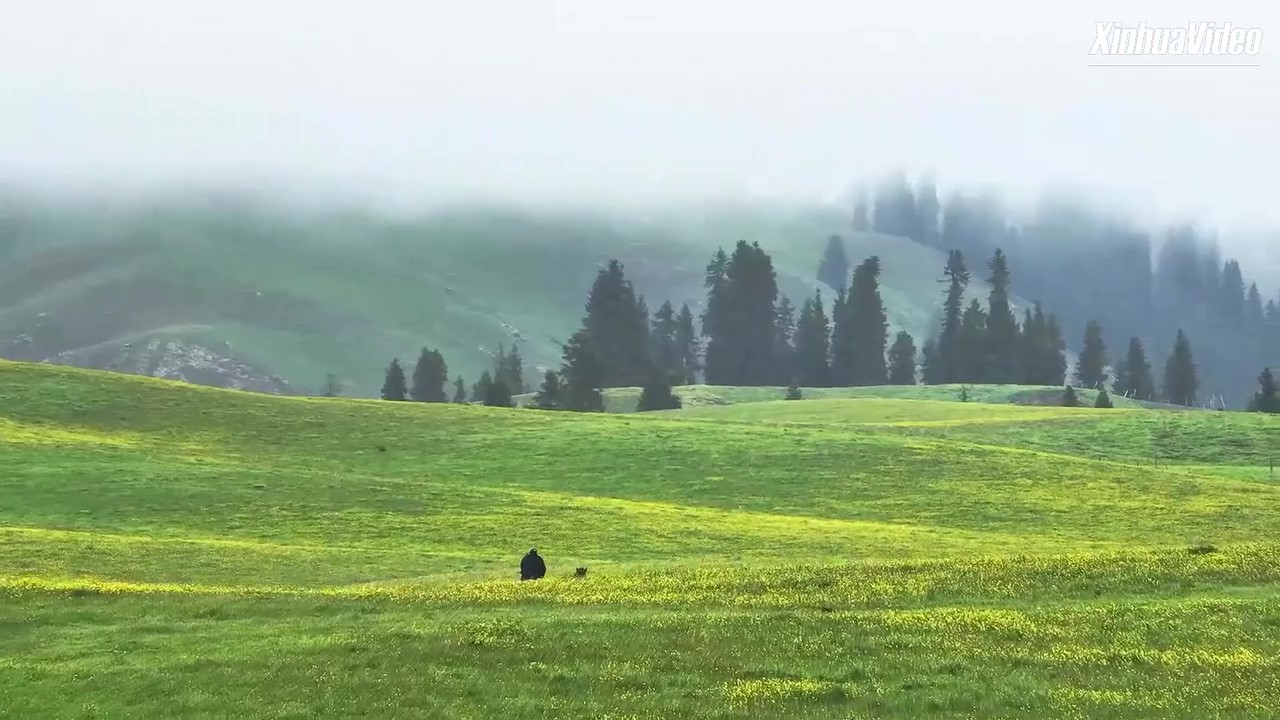
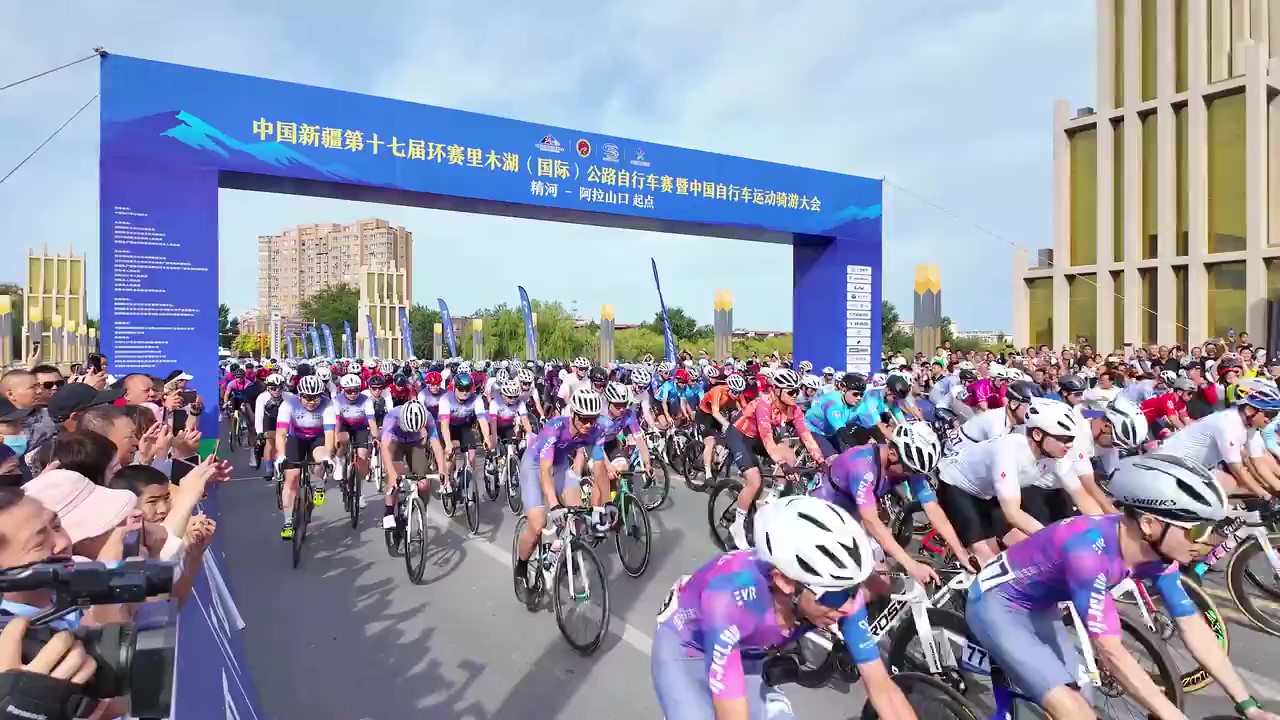

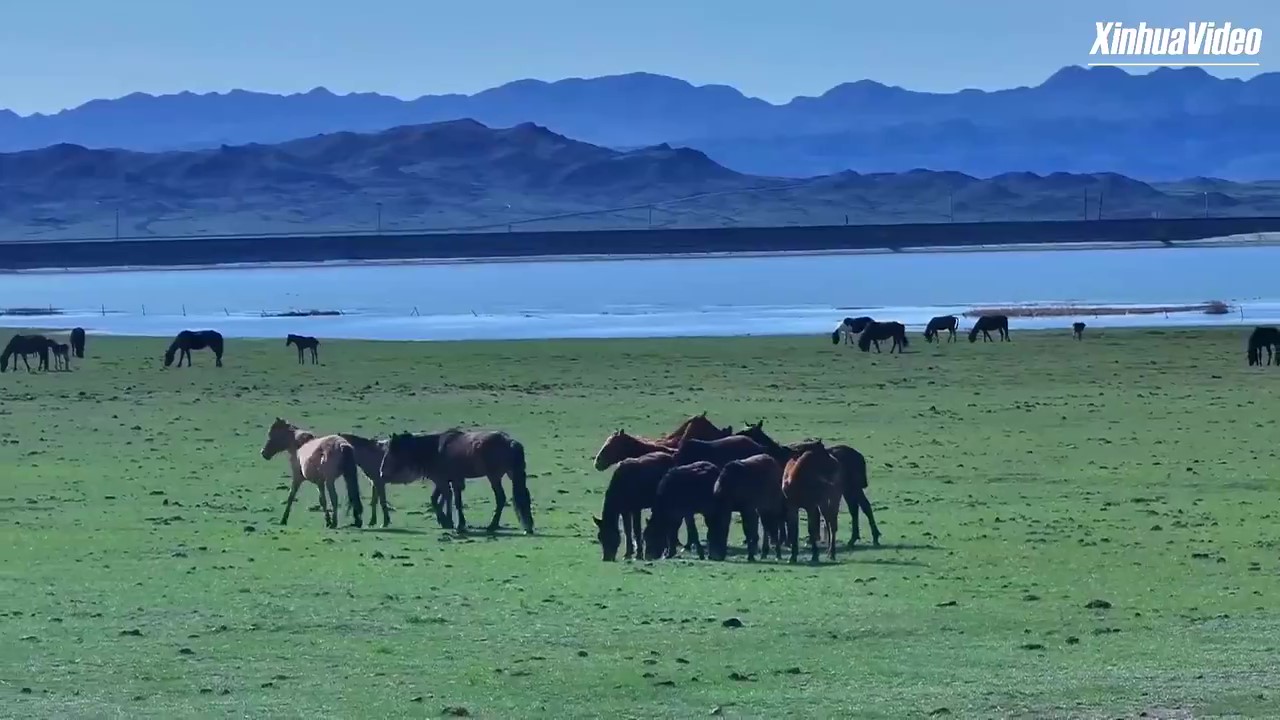
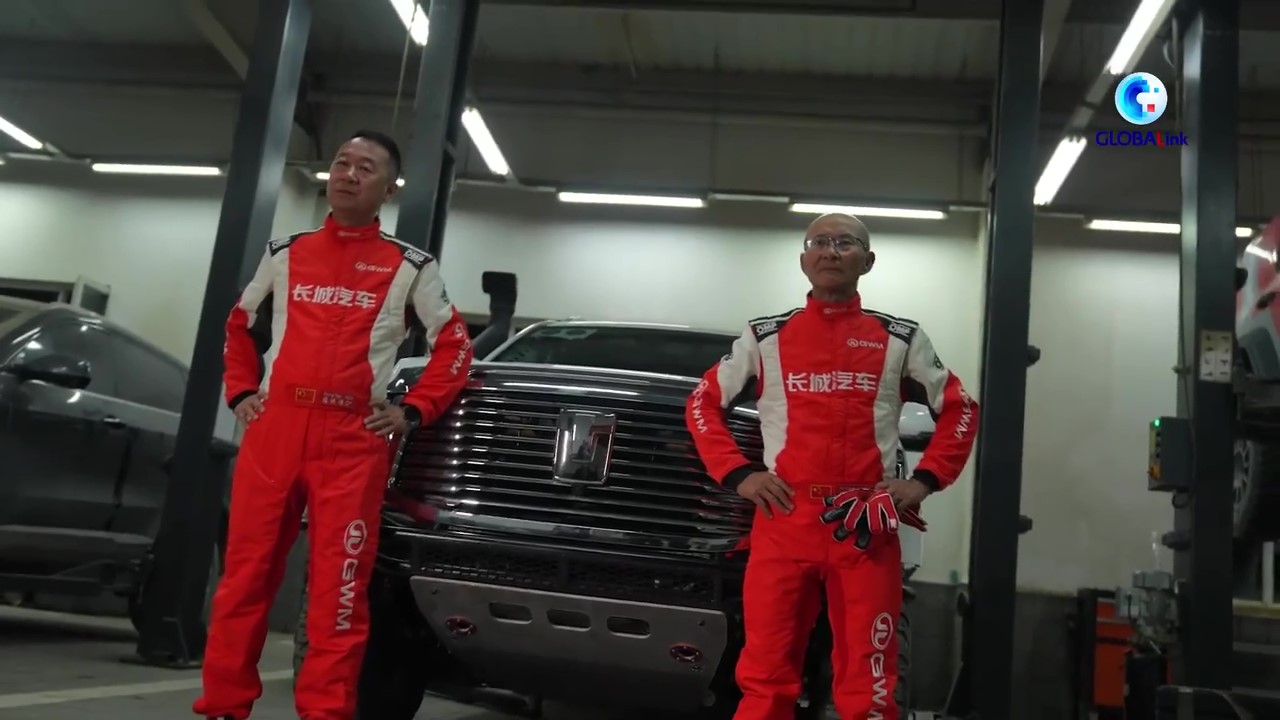

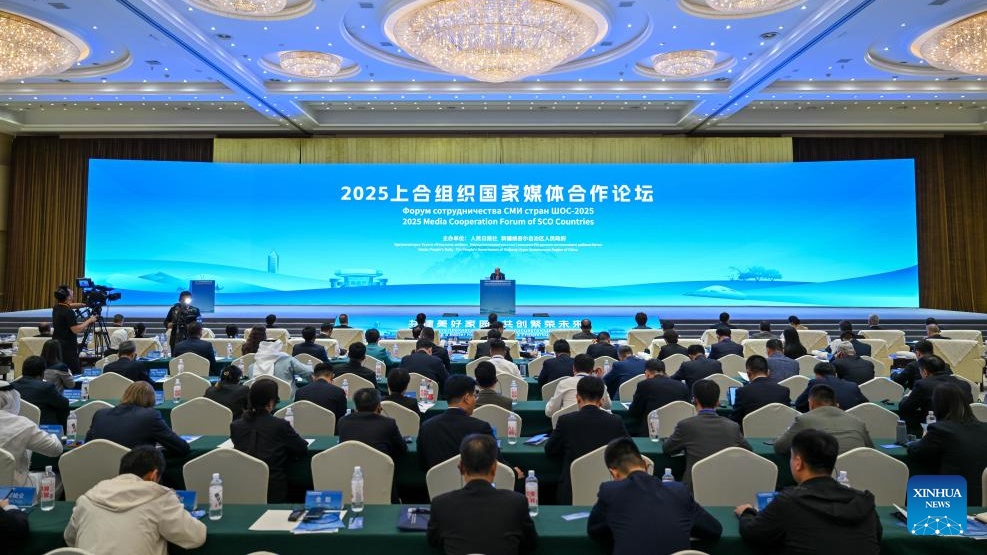
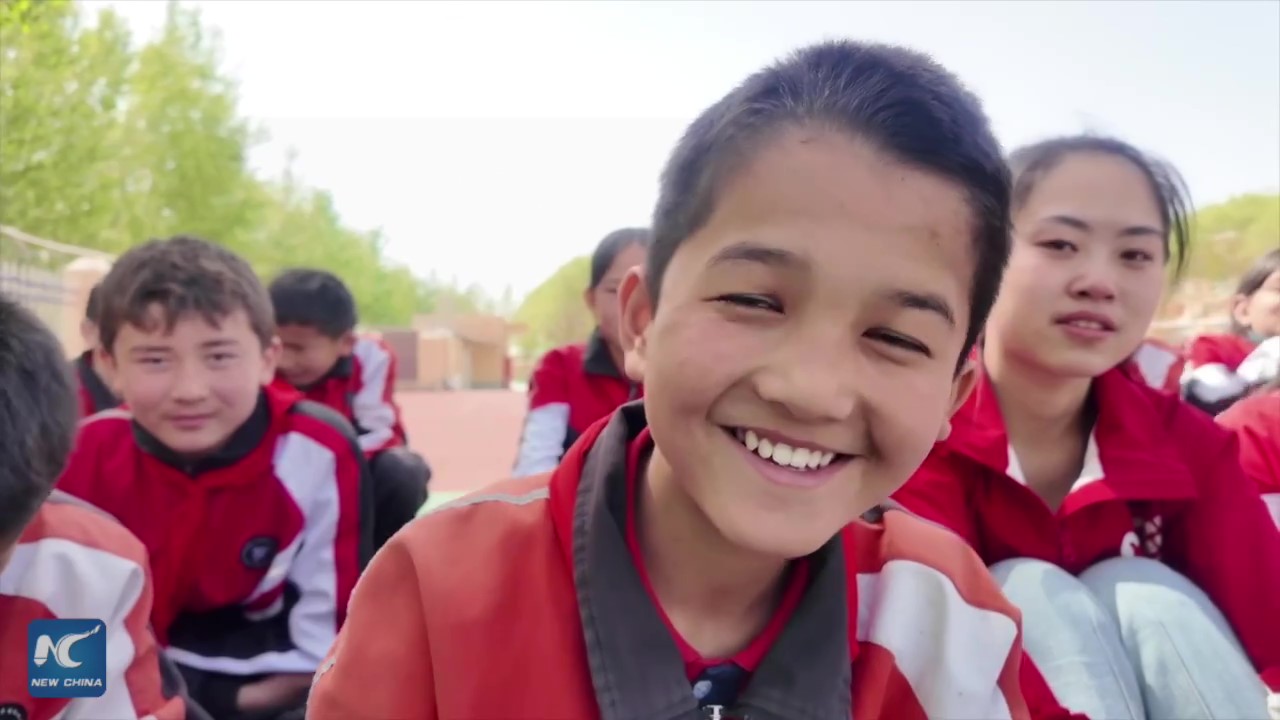
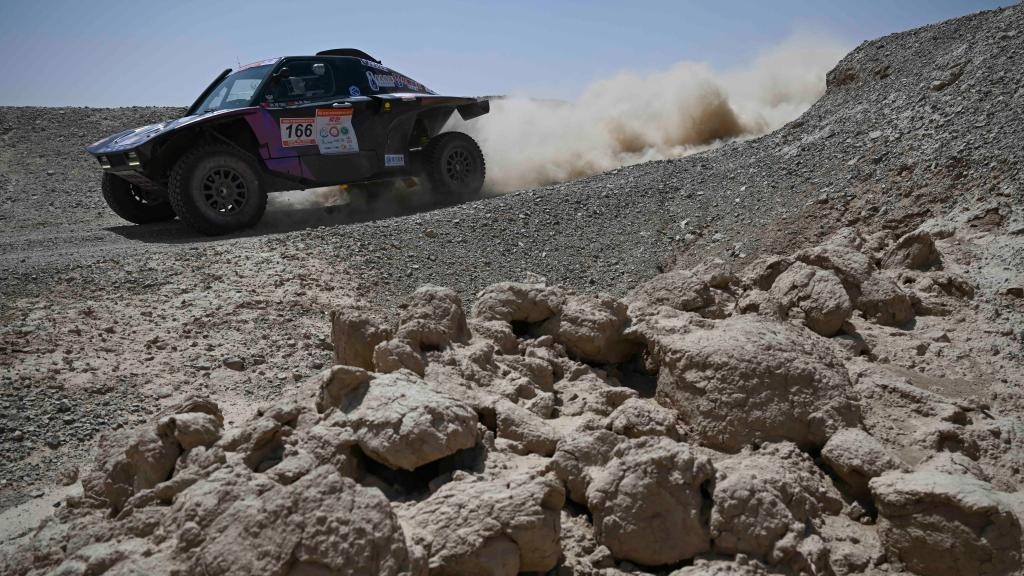


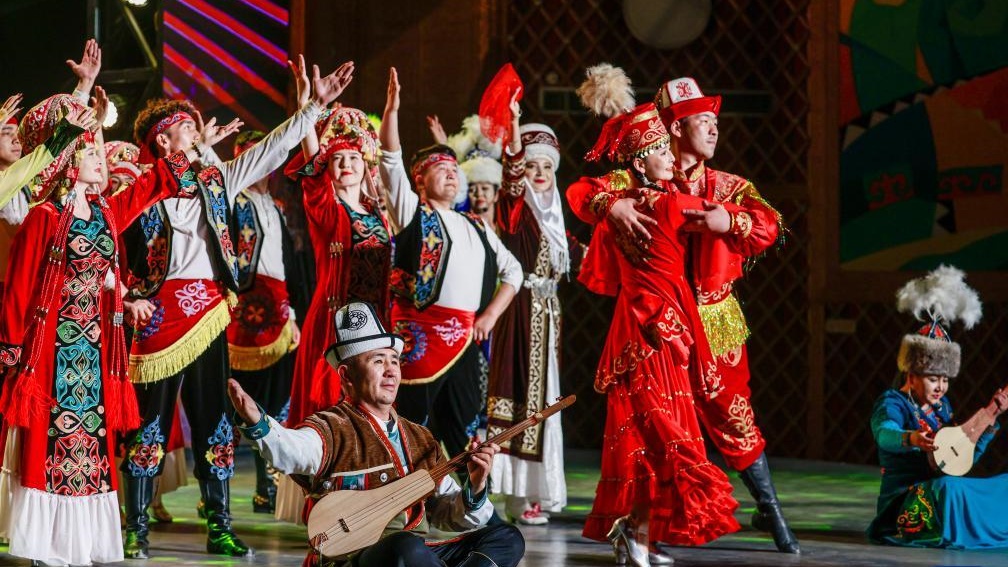
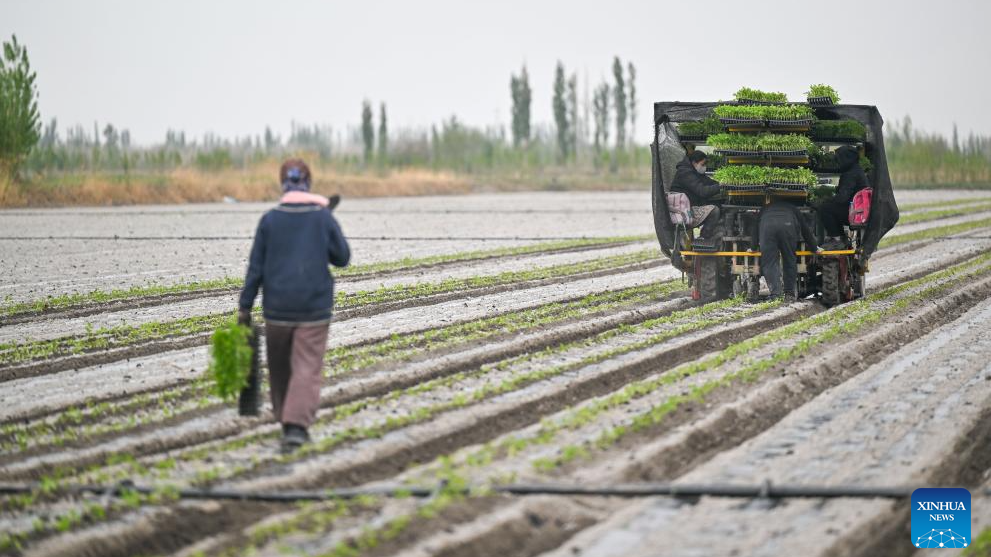


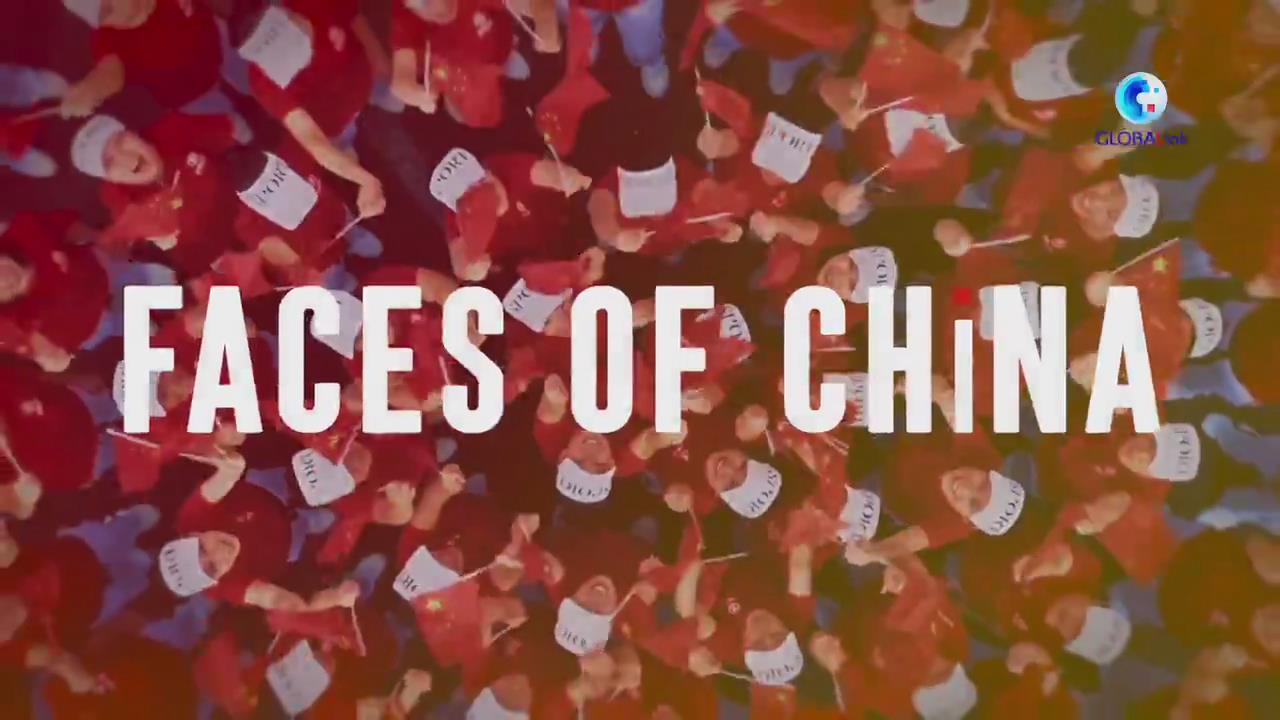
.png)
